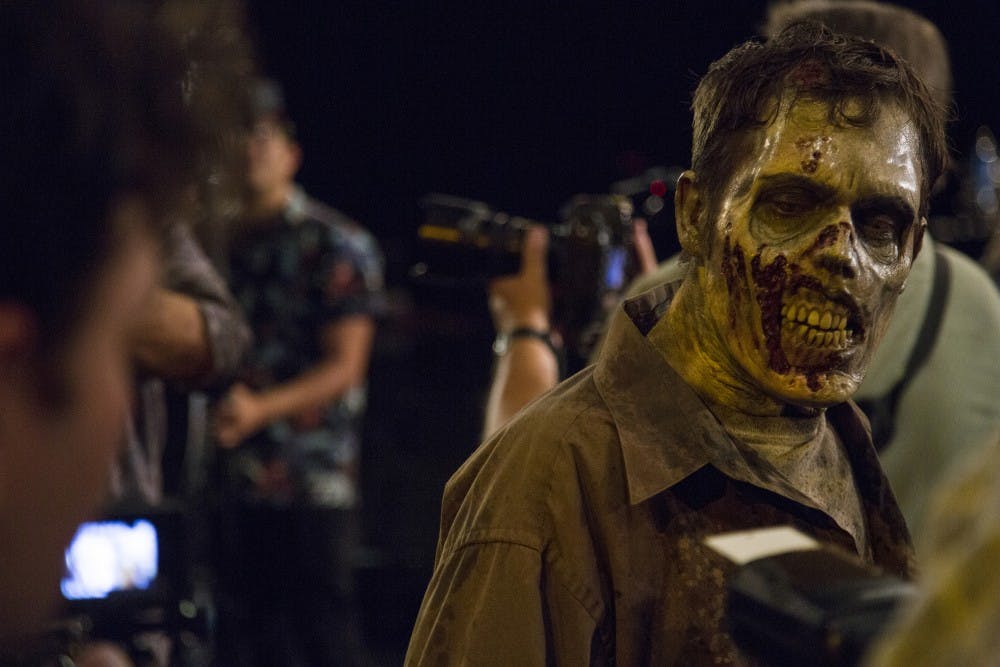In 2003, 18-year-old Devin Moore killed two police officers and a 911 dispatcher after he was arrested for stealing a car. Moore then escaped in a stolen patrol car and was arrested again. When asked by police why he did it all, he said: "Life is a video game. Everybody's got to die sometime."
It’s not uncommon to see “Rated M for Mature," “Rated R" or “TV-MA” on any given video game, new movie or popular television show. This generation is known for pushing the limits with shows containing these ratings for unconventional violence like "American Horror Story" and "Bates Motel."
We enjoy the jolts of fear from the safety of our couches because it’s a distraction from the mundane duties of our everyday lives.
The world's strange desire to make tourist sites out of concentration camps and our haste to gawk at gruesome car accidents as we drive by on the highway is another demonstration of our craving for constant shock and awe.
With every corpse we see on "The Walking Dead," we become more desensitized to real-life horrors. We witness so much live footage of terrorist attacks that the idea of someone leaping out of a burning building doesn’t affect us any more than Kim Kardashian’s 72-day marriage.
The argument against violent video games has been discussed frequently since the two Columbine High School shooters, Eric Harris and Dylan Klebold, were found to have been frequent video game players. The problem is not just in video games, it's in the entire entertainment industry.
Movies in the horror genre, music videos promoting gun usage and online viral videos posted by major news outlets depicting violent beheadings — we see it every day, but it doesn't stand out to us because it has turned into a norm.
The sick obsession we have with gore is not just affecting us, it’s affecting the next generation to come, too. It’s no secret that children observe and replicate behaviors demonstrated by adults in their lives.
In David Buckingham’s novel "After the Death of Childhood," he describes children's particular fascination with horror.
“While many of the children described how they had been scared and given nightmares as a result of watching horror, their prime motivation for doing so was clearly to do with pleasure,” the book reads. “Many of the children expressed the wish to watch ‘scary’ things again, even where their first experiences of them appeared to have been quite traumatic.
"The wish to ‘see it again’ — and the practice of repeat viewing — are, on one level, simply about reliving the pleasure.”
Buckingham's description illustrates children’s unhealthy curiosity with moments of violence, and it’s disturbing to think that we may be raising a group of people to be impervious to the devastation of murder and crime.
Anna Conn, pre-med health science major and mother-to-be, believes in limiting the amount of violence her child is exposed to as much as she can.
"It's impossible to not have any because of the world we live in, but it definitely takes a kid's childhood away with putting that much violence in front of them," Conn said. "I'm one of those people where I have a visual memory and remember everything I see and that stuff gave me nightmares."
"Comfortably Numb: Desensitizing Effects of Violent Media on Helping Others," a study put together by the University of Michigan, the University of Amsterdam and Iowa State University, found that "people exposed to media violence become ‘comfortably numb’ to the pain and suffering of others and are consequently less helpful" in dangerous situations.
The inherent issue with this numbness is that we’ll have to keep pushing the boundaries in entertainment, we’ll have to keep escalating to satisfy the world’s hunger for shock value.
At some point, we as a society need to recognize the dangers of desensitization and do our part to reverse the damage we've already caused before we lose all sense of compassion toward one another's pain.
We don't want our children to think that violence is only "make-believe" or that it isn't as serious as it is.
It is every parent’s prerogative to decide how much their child is exposed to, but we need to start taking this attraction to brutality more seriously before we start to see a total lack of regard
Reach the columnist at sphaas@asu.edu or follow @_SavannahHaas on Twitter.
Like The State Press on Facebook and follow @statepress on Twitter.
Editor’s note: The opinions presented in this column are the author’s and do not imply any endorsement from The State Press or its editors.
Want to join the conversation? Send an email to opiniondesk.statepress@gmail.com. Keep letters under 300 words and be sure to include your university affiliation. Anonymity will not be granted.




